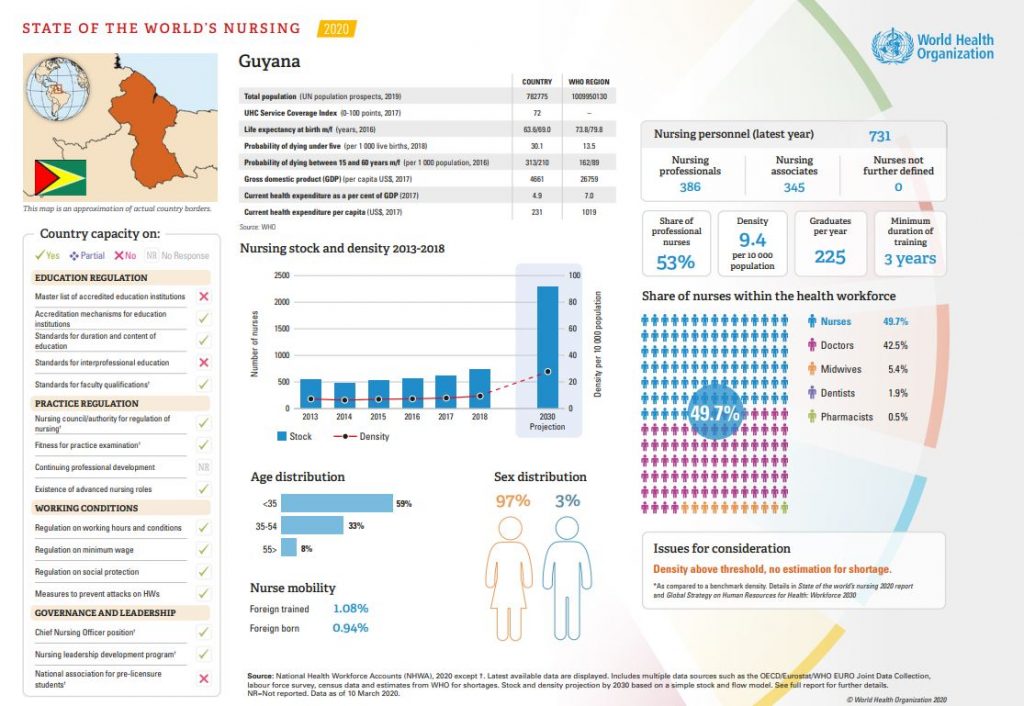WHO calls for increased funding, fair salaries & better working conditions for nurses
To observe World Health Day, the World Health Organisation (WHO) on Tuesday called for increased funding to educate and employ nurses, fair salaries and better working conditions for Nurses across the globe.
The WHO launched its report ‘The State of the World’s Nursing 2020’ which provides an in-depth look at the largest component of the health workforce.
The findings identified priority areas for investment in nursing education, jobs, and leadership to strengthen nursing around the world and improve health for all.
It called for all countries to improve working conditions including through safe staffing levels, fair salaries, respect for occupational health and safety rights, monitor nurse mobility and migration and manage it responsibly and ethically, ensure that nurses in primary health care teams work to their full potential and establish leadership positions including a government chief nurse and support leadership development among young nurses.
“The report’s message is clear: governments need to invest in a massive acceleration of nursing education, creation of nursing jobs, and leadership. Without nurses, midwives, and other health workers, countries cannot win the battle against outbreaks, or achieve universal health coverage and the Sustainable Development Goals,” the WHO said.
According to the report, there are just under 28 million nurses worldwide. Between 2013 and 2018, nursing numbers increased by 4.7 million. But this still leaves a global shortfall of 5.9 million.
In Guyana, there are approximately 731 nurses which accounts for 49.7% of the health workforce. Doctors account for 42.5% of the workforce, midwives – 5.4%, Dentists – 1.9% and Pharmacists account for 0.5%.
The Guyanese nurses’ population consists of 97% female and 3% males.
 In its recommendations, the WHO called for Governments to implement gender-sensitive nursing workforce policies, educate and train nurses in the scientific, technological and sociological skills they need to drive progress in primary health care, strengthen capacity to collect, analyze and act on data about the health workforce.
In its recommendations, the WHO called for Governments to implement gender-sensitive nursing workforce policies, educate and train nurses in the scientific, technological and sociological skills they need to drive progress in primary health care, strengthen capacity to collect, analyze and act on data about the health workforce.
Guyana trains 225 graduates per year but the report pointed out that there is no pre-licensure (also called entry-level) Bachelor of Science in Nursing program which is a four-year program that is specifically designed for students who do not currently hold a state nursing license and have no prior nursing experience or education.
The report recommended that modernisation of professional nursing regulation by using systems that can recognize and process nurses’ credentials globally and strengthening of the role of nurses.
With the ongoing battle to combat the spread of the Coronavirus Disease 2019 (COVID-19), the WHO said “never before has their value been more clearly demonstrated.”
Dr Tedros Adhanom Ghebreyesus, WHO Director General said “Nurses are the backbone of any health system. Today, many nurses find themselves on the frontline in the battle against Covid-19…This report is a stark reminder of the unique role they play, and a wakeup call to ensure they get the support they need to keep the world healthy.”
“Politicians understand the cost of educating and maintaining a professional nursing workforce, but only now are many of them recognizing their true value,” said International Council of Nurses (ICN) President Annette Kennedy.
She noted that every penny invested in nursing raises the wellbeing of people and families in tangible ways that are clear for everyone to see.






